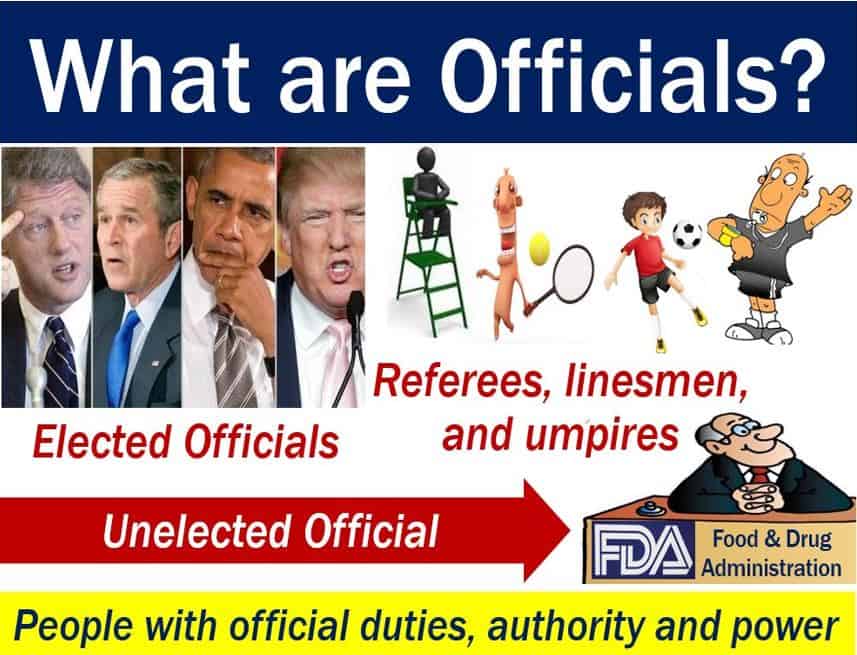Officials are people who have official duties. Somebody who holds public office is an official. We commonly use the term ‘officials’ when talking about representatives of a government department or organization.
An official may also be somebody who is responsible for regulating or controlling an activity. This person ensures that all participants act fairly and comply with certain rules and regulations.
An official has the authority to penalize participants who do not behave fairly. For example, a regulatory official may penalize a pharmaceutical company that misrepresents the benefits of a new medication.
In another example, an official will fine a company that breaks environmental laws.
An official may be a person who holds a title of authority or an office.
Unelected and elected officials
When we vote for somebody for a position of authority, we call that person an elected official.
In most countries, a civil servant is an ‘unelected official.’
During the EU-in-out referendum campaign in the UK in 2016, Brexit supporters used the term ‘unelected officials.’ They used the term in a derogatory sense. They accused Brussels bureaucrats of making important decisions about Britain’s future.

Officials in sports
In sports, an official enforces the rules. They have different names, depending on the sport. For example, in soccer (British: football), there is one referee and two linesmen. Boxing, martial arts, hockey, netball, and rugby also have referees.
The official in tennis, cricket, American football, or baseball is the umpire. The game ‘Australian rules’ also has umpires.
The International Tennis Federation (ITF) refers to chair umpires and line umpires as ‘court officials.’
People who enforce the rules in the Olympic Games are technical officials.
In sports, government departments, organizations, and companies, officials must be impartial. In other words, they cannot allow prejudices to influence their judgment and decisions.
Officers versus officials
The word ‘official’ is related to ‘officer,’ and vice-versa. However, their meanings are not identical.
An officer is somebody who holds a position of authority in a hierarchical organization. For example, the armed forces, police, and government organizations are hierarchical organizations.
Officials are office holders who have been invested with power and authority.
Put simply; an officer is a rank while an official is a job with authority and power. However, the two meanings overlap to a certain extent.
Compound words/phrases with ‘Official’
With the word ‘Official,’ we can create many compound words/phrases. Here are some of them:
Official document
A paper or electronic record that has been formally approved and bears the authorized seal or signature.
Official statement
A formal declaration made by a person in authority, often representing an organization or government.
Official language
The language designated by the government for use in its official documents and public proceedings.
Official capacity
The position or role held by someone in a formal or authoritative capacity within an organization or government.
Official transcript
A comprehensive record of a student’s academic performance and achievements, issued by an educational institution.
Official ceremony
A formal event or ritual conducted in compliance with established procedures, often to mark a significant occasion or achievement.
Official title
The formal designation given to a person holding a particular position, role, or rank within an organization or government.
Official seal
A symbol or device authorized by an organization or government to validate and authenticate its official documents and records.
Official record
A documented account of events, actions, or decisions that holds legal or administrative significance.
Official appointment
The formal designation of a person to a specific position, role, or duty within an organization or government.
Official spokesperson
An authorized individual designated to communicate on behalf of an organization or government in an official capacity.
Official visit
A formal trip or tour undertaken by a person in authority, often to conduct diplomatic or official business.
Official channel
A designated medium or method through which information or communication is formally transmitted within an organization or government.
Official endorsement
A formal approval or support given by a person in authority to validate or promote a particular idea, product, or individual.
Official directive
A formal instruction or order issued by an authority figure to guide or regulate actions within an organization or government.
Official policy
A formally adopted set of principles, guidelines, or rules established by an organization or government to guide decision-making and behavior.
Official duty
A specific task or responsibility assigned to an individual within an organization or government, to be performed in compliance with established protocols.
Official communication
The formal exchange of information or messages within an organization or government, often conducted according to established protocols.
Official recordkeeping
The systematic process of creating, organizing, and maintaining documented information and data in an authorized manner.
Official protocol
The prescribed code of conduct or etiquette to be followed in official or formal situations, often to show respect and maintain decorum.
Video – What are Officials?
